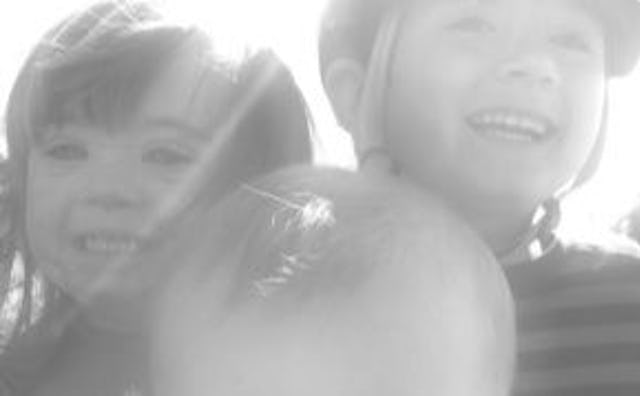Kid-Sized Truths About Down Syndrome

“Well, when Mac is three years old, he’ll be starting to talk, just like Moxie,” he said with a confident nod, his little voice full of assurance.
I stopped for a moment, wondering if I should just let that pass – because Mac, not having a disability (that we know of, anyway), will most likely start to talk long before he’s three years old. And yet addressing that he will likely be talking long before he’s three years old – but Moxie won’t – would necessitate talking about the reason he will but she won’t: Down syndrome.
Then I laughed a little at my hesitation. I mean, it’s not like we don’t talk about disability in our house! Besides the fact that I’m deaf, conversations like the one we had about having no arms or legs isn’t in the slightest out of the ordinary. I think it just feels different when I’m talking about Moxie, Micah’s little sister.
So I took a breath and turned to Micah, “you know, Mac will probably start to talk before he’s three years old,” I said. “In fact, he’ll probably be talking when he’s two years old, and maybe even when he’s a year old.” Micah nodded in that way he does when he wants to make it seem like he knows what I’m talking about…but he really doesn’t. I went on, “Moxie has Down syndrome, honey.” He nodded again, this time with excitement, and said, “yes, like my friend William!” I said, “yes, she has Down syndrome just like William has Down syndrome. That means that both she and William have an extra chromosome, an extra bit of information in their blood. That extra bit of information can change some things and talking can be one of those things.”
“My friend William can talk,” Micah said. “Yeah, honey, he can talk and it doesn’t mean that just because he and Moxie both have Down syndrome that they are the same. He is William and she is Moxie. It’s like you and other boys that are four years old, right? You are a boy and they are boys and you are all four years old, but they might not like Star Trek or reading or playing pirates – you can have some things the same and some things different. It’s like that with William and Moxie. They have Down syndrome in common but he’s William and he’s a boy and she’s Moxie and she’s a girl and they are very different people.”
He nodded, but I could tell that I had lost him after I mentioned Star Trek and playing, and I was right because the next thing I knew, he was talking about a girl that he likes in pre-school and he likes her because she will play Star Trek with him. That’s my boy, all right.
I let it pass, let the conversation move in the fluid way that conversations do, all the while thinking that I’m glad we are talking about this, glad that Down syndrome and the differences that it brings won’t be something we’ll tuck into a pocket, unexplored. Rather, it’s something that we are already pulling out and having frank conversations about.
That’s my advice in this: to be upfront about disability, any disability, but especially about disability present in your own family. Rather than making a big deal about it, and waiting for some auspicious drum-rolling, book-toting moment, weave the talk about disability that is present in your lives into your typical conversations. But do talk about it. Kids are like ants with the largest antannae ever – they are everywhere and tuned in completely when you may not think they are. They can smell it when you are not being honest or you are putting them off, so don’t. Just tell the truth.
Bite-sized, fun-sized, kid-sized. Truth:
- Down syndrome is really pretty easy to understand: it’s just an extra chromosome.
- Down syndrome is different for everyone. Like all disability, it’s not one-size-fits-all.
- It does have the potential to change some things in the way that the person with Down syndrome will learn/grow.
- Remember… Down syndrome is nothing to feel sad about. If you feel it’s a tragedy, your child will pick up on that.
Keep those little antennae in mind when you talk!
This article was originally published on